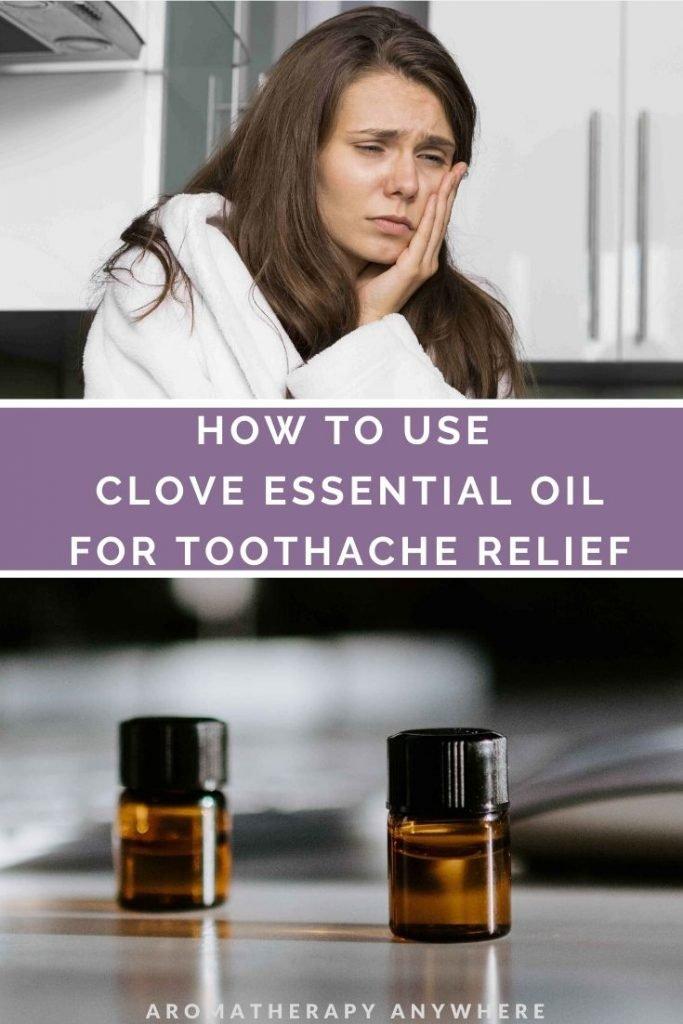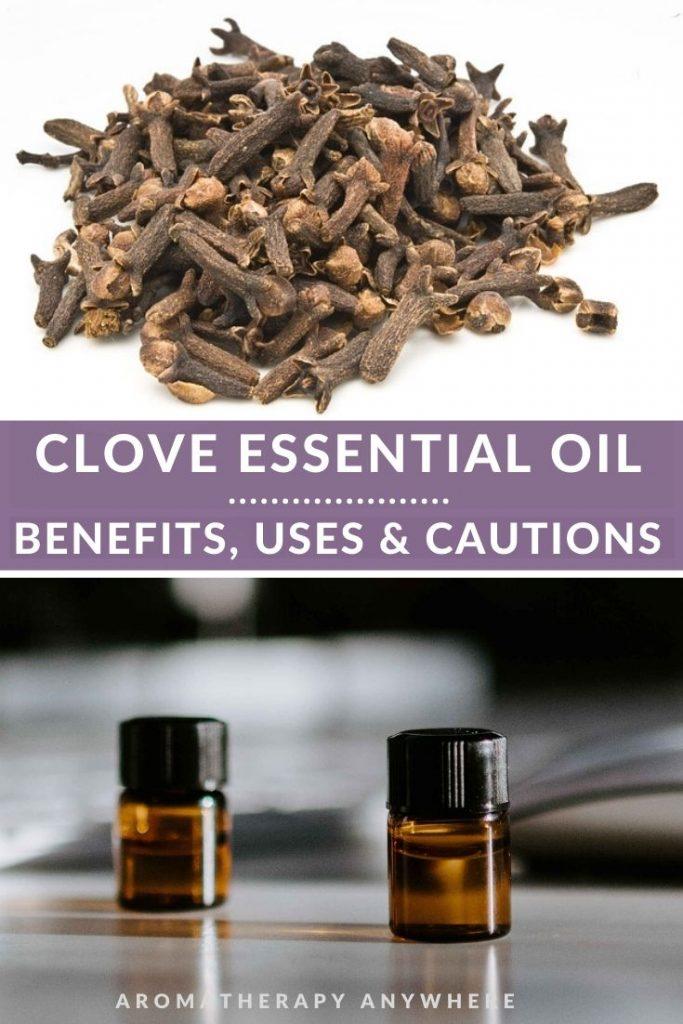As an Amazon Associate I earn from qualifying purchases. See Full Disclosure Here
Clove is a warming and invigorating oil that stimulates the senses and speeds up body functions. Its healing ability is legendary, finding use in a wide range of holistic applications.
Clove essential oil is extracted from the aromatic flower buds of the Syzygium aromaticum tree, an evergreen tree that thrives in warm tropical climates. The plant is native to the Malaku Islands in Indonesia but is now grown in several countries including Sri Lanka, India, and Mexico.
The entire clove plant is fragrant and aromatic but it’s the bud that is the most important and most-used part of the plant. Even the name of the plant stems from the shape of the nail-shaped bud. The name clove is derived from the term ‘clavus’, a Latin term for a nail.
Therapeutic Properties Of Clove Essential Oil
The oil extracted from the clove bud has a strong, spicy aroma. This “hot” oil has powerful antibacterial, antifungal, antiviral, anti-inflammatory, and antiseptic properties. These properties act as an effective immune guard that fortifies your body’s natural protective shield.
From reducing pain and relieving respiratory conditions to boosting immunity and oral care, clove essential oil has a wide range of everyday uses, making it a must-have in your medicine cabinet.
Clove essential oil is very effective for relieving pain associated with conditions such as toothache and muscle pain. It is also used to ease the symptoms of certain respiratory conditions including asthma and cough.
Although this oil is powerful on its own, it often works more efficiently when added to various blends. When combined with certain other oils, clove acts as a catalyst, enhancing the efficiency and therapeutic properties of the other oils in the blend.
Let’s start with the most well-known of all clove essential oil benefits – its use in dental care.
Clove Essential Oil Benefits & Uses for Dental Care
 The use of clove oil in dental applications is well known. So what exactly makes clove so widely used for oral care?
The use of clove oil in dental applications is well known. So what exactly makes clove so widely used for oral care?
The active ingredient in the clove bud is Eugenol, which gives the oil its energizing fragrance as well as its many beneficial properties. Eugenol has natural anti-inflammatory properties, which reduce irritation and swelling in the affected oral area. It is also a powerful anesthetic, which works to effectively reduce the pain of toothaches and numb the area.
There are several different ways to harness the soothing, cleansing, and anti-inflammatory properties of clove oil for oral care.
How to Use Clove Essential Oil for Toothaches
Growing up, a popular home remedy for a toothache was to place a clove but on the affected tooth and bite hard on it for a few minutes. As the oil from the bud was released with the biting down, it numbed the area and stopped or at least reduced the pain till we could get to the dentist.
Years later, I used the same clove remedy for my son and it worked wonderfully. If you have full clove buds in your kitchen pantry, you’ll find that it works really well to reduce that sharp, unbearable pain of a toothache.
For those who don’t use this spice in their cooking, clove oil is a powerful alternative. The important thing is to know how to use this strong oil the right way.
Before you put clove oil in your mouth, you must remember the first safety rule of using essential oils – never use undiluted essential oil directly on your skin or in your mouth. Essential oils are concentrated extracts and can cause severe irritation when used without proper dilution.
The right way to use clove essential oil to reduce the pain of a toothache
- Add 2 drops of organic clove essential oil to ½ teaspoon of edible carrier oil. Using an edible carrier oil is important as you will be putting this in your mouth. The best choices for edible carrier oil are Olive, Sweet Almond, and Coconut oil.
- Dip a clean cotton ball into the solution and let it soak up the oils. .
- Remove the cotton ball from the oil blend and gently squeeze out the excess oil.
- Place the oil-soaked cotton ball on the affected tooth. You may need to bite down gently to keep the cotton in place.
- It may take a few minutes for the eugenol to act and numb the area to relieve the pain.
- Repeat steps 1- 5 every 2 to 3 hours or when you feel the numbness wearing off and the pain starts to get more intense.
Precautionary note: DO NOT add more clove drops in an attempt to get faster relief. This is a very strong oil and can burn your gums. If you feel an uncomfortably painful sensation even with the above dilution, dilute it even more by adding 2 drops of clove oil in 1 teaspoon of carrier oil.
Clove Essential Oil Benefits & Uses for Pain Relief
Clove doesn’t just relieve the pain of toothaches. Its strong anti-inflammatory and analgesic properties make this oil an all-round natural pain reliever. It is particularly useful for relieving headaches and reducing pain and muscle joints.
When using clove oil topically to reduce pain, the NAHA or National Association for Holistic Aromatherapy, recommends using 1 to 2.5% dilution for normal skin and a 0.5 to 1% dilution for sensitive skin.
- To get a 0.5 dilution, mix 3 drops of clove oil in one ounce of carrier oil.
- For a 1% dilution, mix 6 drops of clove oil in one ounce of carrier oil.
- For a 2.5 % dilution, mix 15 drops of clove oil in one ounce of carrier oil.
Jojoba Oil and Fractionated Coconut Oil are the best carrier oils to use to dilute clove essential oil.
To use clove oil to relieve a headache, gently rub your temples and forehead with a 1 – 2% dilution of clove oil. Another way to get the pain-relieving benefits of clove essential oil for headaches is by adding a few drops to your diffuser and inhaling the aroma of the oil.
The flavonoids in clove oil also have anti-inflammatory agents, which make the oil very effective for reducing pain in muscles and joints. To reduce muscle and joint pain, massage the affected area with a 1 to 2.5 dilution of carrier oil. Use a lower dilution of 0.5 to 1 % if you have sensitive skin.
Clove Essential Oil Benefits for the Immune System
Clove essential oil is rich in antioxidants, which work by eliminating free radicals that harm healthy cells in the body. This helps to boost the immune system, which is crucial to staving off a wide range of ailments, including the cold and flu.
Clove is one of five oils in the hugely popular Thieves Essential Oil blend from Young Living. Thieves Essential Oil is specially formulated with a combination of oils known to boost immunity including Clove, Cinnamon Bark, Eucalyptus, Lemon, and Rosemary.
You can also get the immunity-boosting benefits of clove by adding any of these immune-boosting essential oil synergy blends to your diffuser. Most of the synergy blends on that list contain clove essential oil.
Oils That Blend Well With Clove Oil
To create the best blends with clove oil, you must first know which aroma families combine well with clove.
The sweet, herbaceous aroma of oils such as Fennel and Rosemary temper the spicy aroma of Clove, making them a great combination to use in a diffuser or in healing blends.
With their warm, aromatic characteristics, spicy essential oils such as Wild Orange, Cinnamon, Ginger, Frankincense, and Cedarwood essential oils also blend well with Clove.
Clove does not blend well with oils from the mint aroma family because they both have very strong aromatic characteristics that clash when added together in a blend.
Because of its overpowering aroma, clove does not blend well with most oils from the citrus and floral aroma families. Its strong spicy aroma overpowers the citrus and floral aromas of oils from these two families. You may be able to use clove with juniper berry, lemon, grapefruit, and jasmine but you have to be careful to add just one or two drops to the blend.
Combine 3 drops Clove, 2 drops Cinnamon, and 1 drop Blood Orange essential oils to create a warm, invigorating diffuser blend to use during fall and winter.
A Popular Addition to Many Fall & Holiday Diffuser Blends
Its warm, spicy characteristics make clove essential oil a popular addition to many autumn and holiday diffuser blends.
Check out these diffuser blend recipes that use clove essential oil as one of the ingredients:
Fabulous Fall Essential Oils & Blends
Adding a drop or two of clove essential oil to any of these Christmas blends will add a subtle spicy note to the blend. Don’t add too much as close has a strong aroma that will overshadow the other aromas.
Recreate Your Favorite Christmas Scents With These Essential Oil Blends
Traditional Christmas Essential Oil Blends
Create Fabulous Fruity Christmas Scents With Essential Oils
Clove Oil Cautions and Concerns
Clove oil is very strong and should not be used on children 18 months or younger.
Do not use this oil for teething babies and toddlers. It is only used for dental care in adults.
Best to avoid using clove essential oil if you are pregnant.
Dilute heavily before using on your skin. Rotate with other oils to avoid contact sensitization.
Before topical application, test for sensitivity by applying to a small patch of skin and waiting 24 hours for a possible reaction.
Always consult with your physician before using clove essential oil for any purpose.
Related Reads:
Immunity Boosting Essential Oils & Blends
10 Effective Ways To Boost Your Immune System Naturally
 Disclaimer: This information is not intended to serve as medical advice. Please consult your doctor before using any natural medication or if you experience any unusual symptoms. See Full Disclaimer here.
Disclaimer: This information is not intended to serve as medical advice. Please consult your doctor before using any natural medication or if you experience any unusual symptoms. See Full Disclaimer here.









